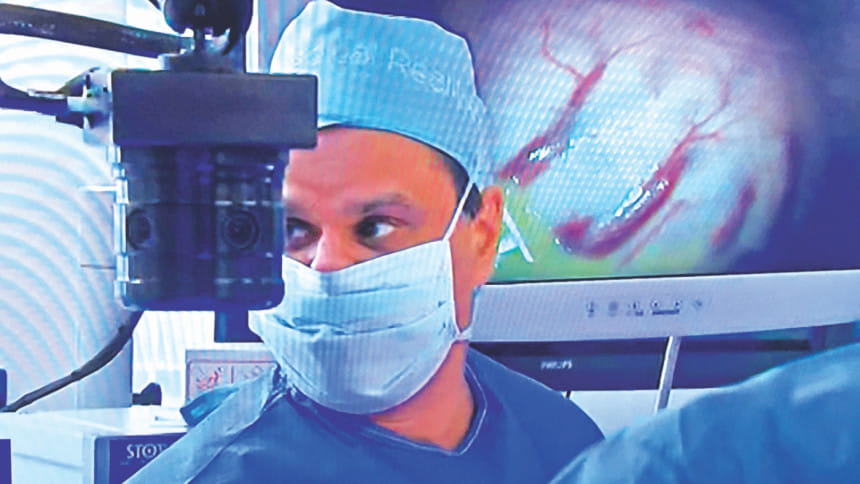A step towards future

Medical students and trainee surgeons for the first time were able to view a 360-degree live stream of an eye surgery in the UK courtesy of years of effort by Shafi Ahmed, a doctor of Bangladeshi origin.
The surgery performed this Pahela Baishakh was streamed via a website and medical students and trainee surgeons across the world were able to watch on their computers and mobile devices with VR headsets.
“The approach, as part of a plan to help training, could improve and transform learning of surgeons worldwide including that of the developing world,” said Shafi, a surgeon at the Royal London Hospital Whitechapel.
Medical students and trainee surgeons could get practical training on surgery via mobile phones with internet connections and a virtual reality headset, something that could drastically reduce the cost of travelling abroad for surgery training.
This concept seems valuable as, according to the 2015 report by the Lancet Commission on Global Surgery, about five billion people worldwide do not have access to safe surgery.
“If that is to change, a global shortage of some two million surgeons, anaesthetists and obstetricians will need to be trained over the next 15 years,” Shafi said.
It might appear a wishful thinking, but it is actually not.
Medical Realities, the company founded by Shafi in early 2015 together with VR innovator Steve Dann, is currently working to launch a software that would enable doctors to teach remotely using 360-degree streaming.
Explaining 360-degree streaming, he said, “In my vision [the ultimate goal], you'll have a virtual body in front of you, and you would get haptic feedback gloves, you pick up a scalpel, and you feel it normally, you make a cut and you see the incision, it's all realistic.
“Ultimately, people will be able to use virtual reality to carry out operations and train themselves through virtual operations. That'd be our endgame,” said Shafi.
He believes that the new technology would allow medical students and surgeons to focus not just on what the surgeon was doing, but also on what other members of the team were up to and follow the intervention at close quarters in an operating theatre.
Shafi's success has not come in a day. He spent years experimenting with the technology for the benefit of healthcare as he always dreamt of improving on ways to improve healthcare, especially for the developing countries.
He travels frequently to medical schools in problematic areas from Gaza to his native Bangladesh for charity reasons and witnessed the lack of infrastructure, training, and equipment in those countries. He thinks radical change is required to achieve global healthcare and kept on trying ways of improving healthcare.
In 2013, the physician got hold of a pair of Google Glass, and grabbed headlines by using them to live-stream the removal of cancerous tumours from liver. About 13,000 students from 113 countries tuned in and asked questions that popped up on the lower corner of his Google Glass. He responded to them just by speaking.
On his approach, he said, “Thousands of medial students, especially those from low-income countries, can be trained by someone in Harvard, or in London, or in Rome with virtual reality.”
Shafi, son of late Sufia Khanom and Mimbor Ali of Sylhet, migrated to the UK in the early 70s with his parents, a sister and two brothers.
He qualified from Kings College Hospital Medical School in 1993, obtained FRCS from Royal College of Surgeons of Edinburgh & Royal College of Surgeons of England in 1997. In 2010 he obtained PhD on genetics of colorectal cancer from Queen Mary University of London.
He now works at the Centre for Academic Surgery where he is pioneering single incision laparoscopic colorectal surgery (virtually scar-less surgery).
Despite his hectic schedules, Shafi does not forget his roots. He is also in the board of Proshanti, a local charity established in 2010 to improve healthcare for underprivileged women in Juri of Moulvibazar and Sylhet, a region home to many British Bangalees.

 For all latest news, follow The Daily Star's Google News channel.
For all latest news, follow The Daily Star's Google News channel. 





Comments